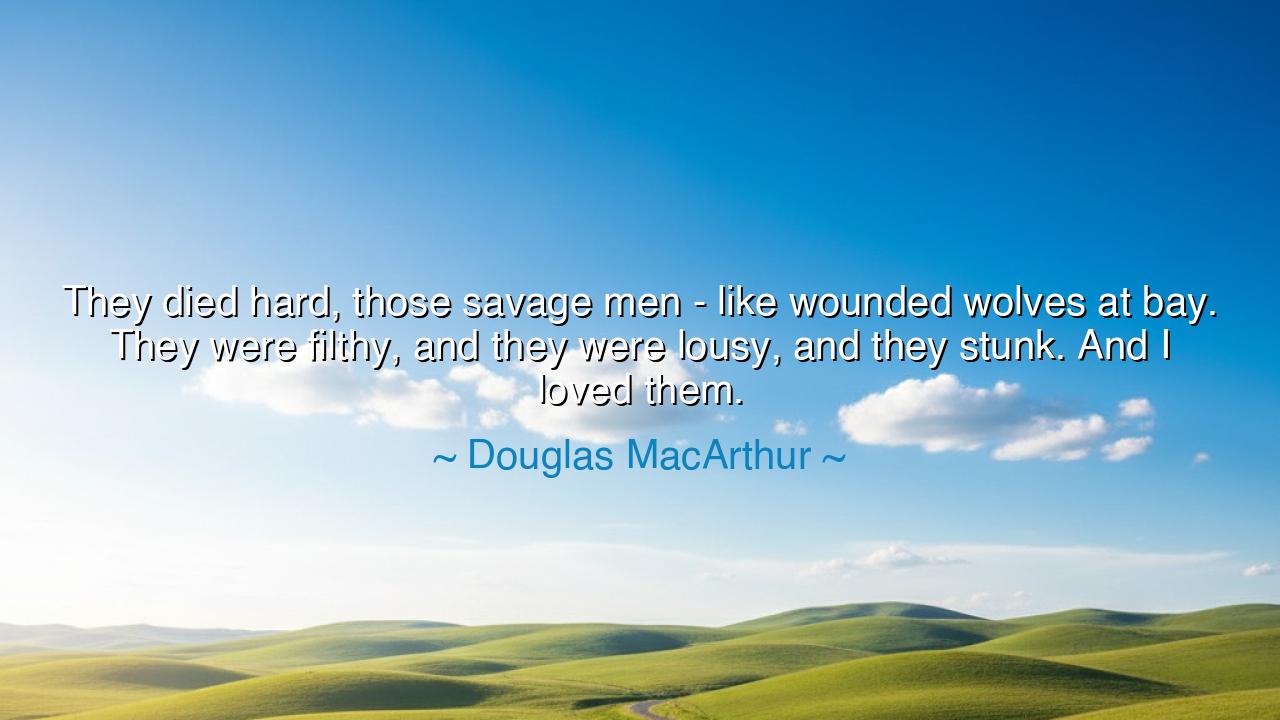
They died hard, those savage men - like wounded wolves at bay.
They died hard, those savage men - like wounded wolves at bay. They were filthy, and they were lousy, and they stunk. And I loved them.






“They died hard, those savage men — like wounded wolves at bay. They were filthy, and they were lousy, and they stunk. And I loved them.” — Douglas MacArthur
Thus spoke General Douglas MacArthur, the warrior-philosopher of the twentieth century, whose words burned with both sorrow and reverence. In this fierce and tender confession, he pays tribute to the soldier, not as a figure of glory but as a being of flesh, fear, and undying courage. When he said, “They died hard, those savage men — like wounded wolves at bay,” he spoke not from the comfort of command but from the heart of remembrance. He was recalling the men who had stood beside him in the crucible of war — men whose hands were calloused, whose faces were blackened by mud and gunpowder, and whose souls were tempered by agony and fire.
The origin of these words reaches back to the battlefields of the Pacific during World War II, where MacArthur led the Allied forces through blood and ruin toward the liberation of nations. He had seen his soldiers — young and weary, far from home — endure the unendurable. They fought not for wealth, nor for fame, but for survival and for each other. Their bodies were broken, their spirits battered, yet they did not yield. When he called them “savage men,” it was not an insult but a praise — for in the fury of combat, civilization falls away, and what remains is the raw, primal strength of the human will.
“They died hard,” he said, “like wounded wolves at bay.” The image is stark, yet filled with love. For a wounded wolf does not flee; it fights, teeth bared, until its final breath. MacArthur saw this same ferocity in his soldiers — men who, cornered by death, still chose defiance over despair. In the mud of Bataan, in the jungles of New Guinea, in the sands of Leyte, they clung to life and to each other. They were not gods or heroes of legend, but ordinary men made extraordinary by hardship. And in their struggle, he saw the very essence of honor — not the polished kind spoken of in speeches, but the rough, bleeding kind born in the chaos of battle.
He does not romanticize them. He calls them “filthy,” “lousy,” men who “stunk.” But these words, instead of diminishing them, humanize them. MacArthur strips away the veil of military grandeur and reveals the truth of war — that it is fought not by perfect men, but by imperfect souls who suffer and sacrifice beyond measure. He loved them not for their cleanliness or their polish, but for their spirit, their loyalty, their refusal to surrender to despair. His love was that of a father for his sons — pride mingled with grief, reverence born of shared struggle.
The sentiment behind MacArthur’s words echoes through history. In every age, those who endure the darkness of war are bound by a brotherhood beyond words. The Spartans at Thermopylae, standing shoulder to shoulder against a tide of enemies; the Union soldiers at Gettysburg, who charged through smoke for a cause greater than themselves; the marines at Iwo Jima, who raised a flag on a mountain of death — all are bound by the same spirit MacArthur described. Their greatness lay not in perfection, but in persistence. They were “savage” in courage, “wounded” in body, yet unconquered in heart.
The lesson is this: nobility is not found in appearances, but in endurance. True love for one’s fellow man is not born of admiration for their beauty or refinement, but of respect for their struggle. To live as these soldiers did — fiercely, loyally, unflinchingly — is to embody the highest form of humanity. In every life, battles will come — battles of faith, of hardship, of grief. When they do, remember MacArthur’s words, and fight like those “wounded wolves at bay.” Stand your ground. Love fiercely those who fight beside you. Honor those who have fallen, not with empty praise, but with lives lived bravely in their memory.
So remember the teaching of Douglas MacArthur: “They died hard, those savage men... And I loved them.” These are not the words of a general speaking of war; they are the words of a man speaking of love — love for courage, for loyalty, for the indomitable flame that burns within the human heart. Let that flame live in you. Whatever your battlefield may be — whether in war, in work, or in the quiet trials of your own soul — face it with the same ferocity, the same endurance, the same fierce love of life. For though time passes and generations fade, the spirit of those “savage men” — that pure, unbreakable will — lives on in all who dare to stand firm in the face of darkness.






AAdministratorAdministrator
Welcome, honored guests. Please leave a comment, we will respond soon